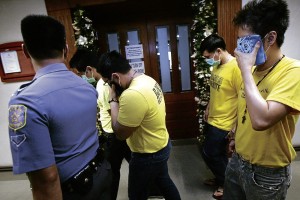US consul general: Anikow trial ‘appears very slow’

The four media-shy Anikow murder suspects under escort Thursday at Makati Regional Trial Court. NIÑO JESUS ORBETA
A high-ranking US Embassy official monitoring the George Anikow murder case said the three-week-old trial on the US Marine officer’s killing “appears to me as very slow” and that the victim’s family is considering sending its own private lawyer to help the public prosecutors.
Consul General Michael Schimmel made the remarks off-court after attending Thursday’s hearing at Makati City Regional Trial Court Branch 59, together with two other embassy representatives.
“I’m not entirely familiar with the proceedings in the Philippines, but this one appears to me as very slow. But people tell me it’s normal procedure,” he said in an Inquirer interview.
Schimmel said the family of Anikow is also considering tapping its own private prosecutor. “That notion could be interjected at any time, although I am not in any position to comment.” Anikow, 41, was a US Marine major and the husband of a US diplomat then posted in Manila.
In the hearing, lawyers defending the four Filipino suspects in the Nov. 24, 2012, killing have apparently found themselves fighting two more fronts: the media and cyberspace.
Article continues after this advertisementThey asked the court to issue an order barring the media from playing the video that purportedly captured the suspects in the act of mauling and stabbing the American dead during an early morning altercation at a security checkpoint in Makati City. The video, taken by a security camera of the Rockwell Center, has since gone viral.
Article continues after this advertisementThe defense lawyers claimed that the clip, which had been aired in various news programs during the early stages of the police investigation, constituted “undue publicity” that could shape public opinion against their clients.
In a verbal manifestation before Judge Winlove Dumayas, lawyer Jay de Castro said: “We would want to make an appeal if we could at least cite them in contempt (and order them) not to continue the presentation because anybody could see it and it’s just the version of the prosecution.”
“The continuous presentation of the events in this incident from the version of the prosecution destroys the reputation of the accused in this case,” he added.
De Castro is the counsel for one of the four accused, Galicano Datu III, who was present in the hearing along with the other suspects—Osric Cabrera, Juan Alfonso Abastillas and Crispin de la Paz.
“We have basis in saying that the media has not been fair to the accused, considering that the footages presented the mauling of the victim George Anikow but not the sufficient provocation and unlawful aggression he committed,” De Castro later told the Inquirer in an interview.
Also addressing the court, Teodoro Jumamil, defense counsel for De la Paz added: “The unrestrained uploading of the video on YouTube will trudge into the constitutional rights of the accused to due process … The undue publicity may mold public opinion against the decision the court may render.”
Miguel Damaso, lawyer for Abastillas, also noted that “only portions of the whole video footage were picked for uploading in the social media. Only portions which will change the mindset of the public were shown.”
Damaso said viewers are likely to “formulate certain conclusions” from these fragments, especially those that tend to depict the Nov. 24 incident as a street battle that pitted one man against four.
De Castro went on to point out the comments posted online in reaction to the video, particularly one that said “it’s not safe to travel in the Philippines because Marines are killed.”
He said these comments could be harmful “not only to the accused but to the country.”
But instead of issuing a formal ruling, Dumayas said his court “renders correct decisions and not popular decisions.”
“The court will not be influenced by public opinion,” the judge stressed. “The media is part of our lives, wherever we may be. We’re in such a modern age, no longer stuck in olden times; everyone has a recorder, video cameras.”
Also in response to the defense manifestation, a member of the prosecution, Hannah Arriola, said she doesn’t see the video as basis for a “one-sided appreciation of the case,” adding that she still expected the court to base its decision on the evidence presented.
“So long as (there is a) fair reporting of what is happening and it is not intended to generate adverse or negative public opinion against a particular party, it’s okay,” Arriola said.
Also reacting to the defense panel’s apprehensions, Schimmel said: “In social media, people are free to post anything they want. At this point, the US Embassy does not consider the Philippines unsafe for any American.”
“Although there are travel warnings from the US Embassy especially in certain areas in Mindanao, we encourage people to come to the Philippines, whether they are Marines or civilians,” he added.